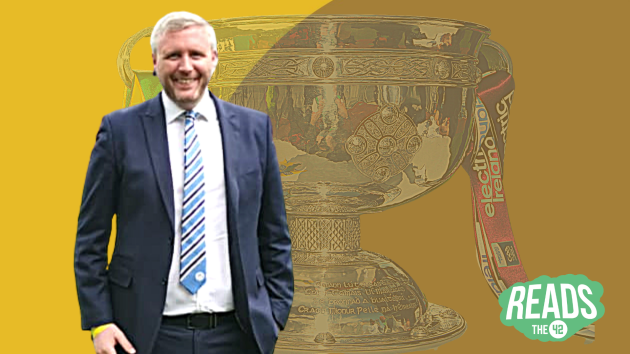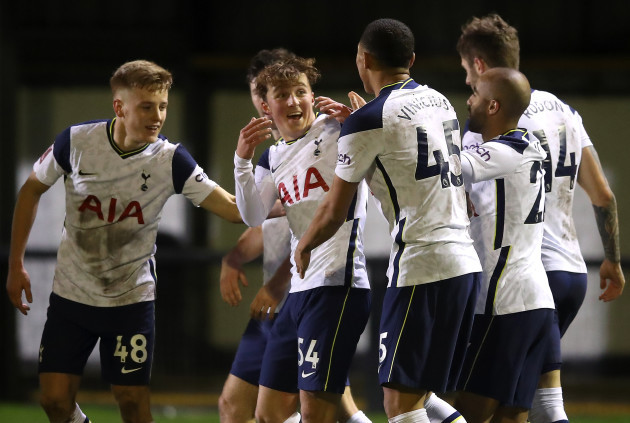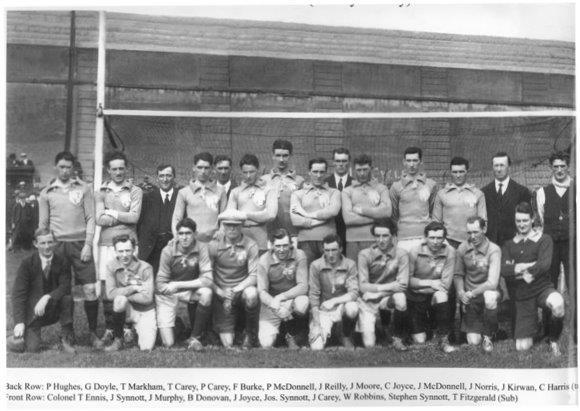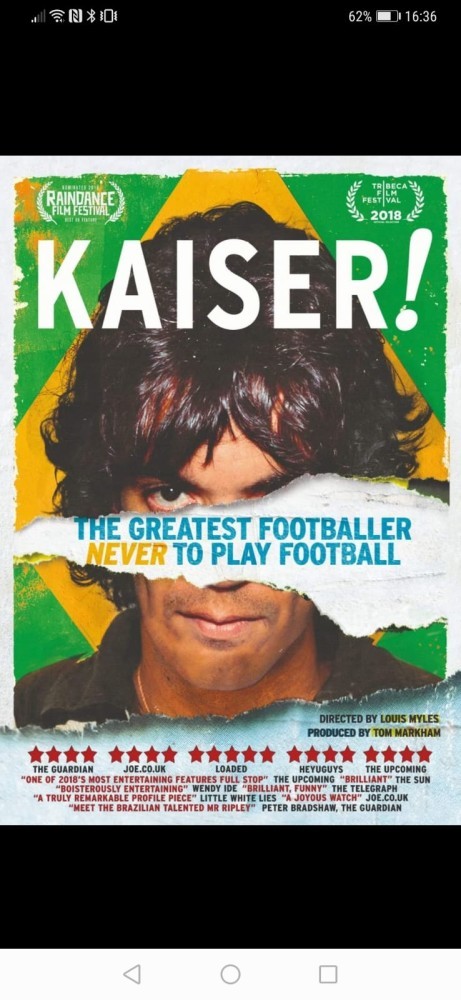THIS IS THE story of two men who never met. One fought in the GPO in Easter week; the other made a film in Rio during Carnival week. There are walk-on parts in the story for Michael Collins, Jack Lynch, a transgender folk singer as well as Brazilian World Cup stars, Zico, Ronaldo and Carlos Alberto, yet the intriguing part of the tale focuses on the two central characters who share the same name.
The first was one of Collins’ informants at Dublin Castle, a freedom fighter wounded during the Easter Rising, imprisoned by the British Army yet later released to spy on them. The second is a footballing filmmaker and administrator, whose documentary on a Brazilian who conned everyone into thinking he was a footballer premiered at the Tribeca Film Festival.
Tom Markham threads all these stories together, except there is more than one of them. The original was born in 1878; a civil servant in the British system who passed on bits of intelligence to Collins and who was part of the Dublin management team on Bloody Sunday.
His son, Tom Markham II, was a teenage prodigy who played five straight years for the Dublin minors in the 1920s and ‘30s, debuting for the team as a 13-year-old, later becoming the country’s chief veterinary officer; instructing Lynch, the then Taoiseach, to call off an Ireland/New Zealand international in 1967 because of a foot and mouth outbreak.
The third Tom Markham just so happened to be a handy rugby player, a Connacht Senior Cup winner with Athlone in the ‘70s; but the Tom Markham we are going to zone in right now is the youngest of the four, the one who recently struck the deal to take Wigan Athletic out of administration.
That’s only scratching the surface of things. Brokering deals between football clubs and their prospective buyers is one of his sidelines. “A hobby, something I find fun,” Markham says.
- For more great storytelling and analysis from our award-winning journalists, join the club at The42 Membership today. Click here to find out more >
It’s also something he is reputedly very good at which was how and why the Dubliner was engaged by the Bahraini consortium to act as their middleman when they finalised an agreement with the EFL to take control of Wigan in March. Before he knew it, Markham was staying on as a non-executive director.
Impressed by an academy that has produced 10 underage internationals in the last decade, as well as delivering Tottenham’s youngest ever player, Alfie Devine, to White Hart Lane, Markham’s plan is to stabilise the club and get them back to the Championship within five years. The locals, fearful their Wigan would become another Bury, anointed their new owners as heroes.
Yet these days Wigan’s needs aren’t as great as Ireland’s. One win since 2019– and that came against Andorra – is as good as it gets for our senior international team. Post Brexit, new regulations prevent English clubs taking Irish players on professional forms until their 18th birthday, which makes you worry even further.
This is when one of the most famous names from the GAA’s past delivers some solutions for Irish football’s future.
In his day job, Tom Markham IV works as the head of strategic business development at Sports Interactive, the makers of the video game, Football Manager. One of the job specs is to check out an annual list of active players and the countries they are eligible to represent.
“As soon as I see an Irish qualified name, I’ll be on to the FAI, because you see a late bloomer like (Leeds and England midfielder) Kalvin Phillips, who has an Irish mother, and if you get that information across early, it has the potential to make a difference,” says Markham, who has previously had discussions about this sort of thing with Ruud Dokter, the FAI’s technical director.
That’s not where his level of influence is going to end, though. “With Wigan, you have to remember that we have barely had time to get our feet under the desk,” says Markham, “but down the line, we will definitely be looking to tap into the Irish market.
“You just know there is going to be a lot more attention paid to Ireland because of the common travel area within the UK. We have seen Sligo Rovers’ deal with Everton; I know there are a few other clubs within the League of Ireland who are looking for strategic partners or for investment.
“The fact that players can’t go across now until they are 18 is preferable in the sense that they can continue living at home for a bit longer, and be more mature when they do make the move. It’s what happens before then that is important. If they have access to an elite training environment, they’ll be in a good place.”
He cuts to the core of the issue in succinct terms: “Look, there will always be a link between Ireland and the UK because there is so much talent at home and there is so much money in the English game. The ideal is to have really good elite academies in regional hubs around Ireland.
“Even if we ended up with just four proper academies, they don’t have to be the equivalent of a category one academy (like Manchester City’s, Liverpool’s). If they are as good as the category two academy that we are running here at Wigan, then the game back home will continue to grow.
“Being brutally honest, it is a tough industry. Irish clubs aren’t backed by the TV deals that exist here. I was at a presentation a while back where it was made clear that the biggest revenue coming into the vast majority of (League of Ireland) football clubs was through donations. That’s admirable by the way; that shows the love and passion that exists for clubs. But you worry whether it is sustainable.
“However an academy that develops players creates a system that can generate income; if you then reinvest a lot of that money back into the system, you have your sustainable model.
“Iceland managed to create that kind of model off a much smaller population than ours. I’ve no doubt that Irish football has massive potential. And if there is any way I can help, I will.”
**
A century ago, a different Tom Markham was hoping to help a different sport, viewing the GAA as a cultural entity as well as a sporting one. After joining the Irish Volunteers in 1913, the Clareman was wounded during the Easter Rising and subsequently arrested. A story in the Irish Times, headlined ‘Prisoners Released’ and dated 25 May, 1916 listed his name among dozens of Volunteers who had been imprisoned during Easter week.
Markham didn’t hang around getting back to work. Correspondence between him and Collins hints at a level of closeness, Markham referring to Collins as ‘Mick’ in their exchanges; Collins’ biographer, Tim Pat Coogan, crediting Markham as a chief instigator in undermining British rule from inside the Castle during the War of Independence.
“One of Collins’ principal agents was Thomas Markham, a senior civil servant,” wrote Coogan in Michael Collins. “He prepared a report for Collins, providing him with an insider’s account of ‘how Dublin Castle really worked’.”
Markham’s involvement in Bloody Sunday is unknown beyond the photographic evidence (see below) picturing him with the Dublin team prior to that day’s game against Tipperary. A formidable GAA administrator, he set up two clubs in the capital, became chair of the Dublin minor board and edited his own newspaper, The Champion, which promoted GAA in the city.
Within a year of his death in 1939, a memorial committee had formed to honour Markham’s commitment to the association, buying the Cup which has been presented to the All-Ireland minor footballers ever since.
“Of none can it be said that they gave more unselfish and devoted service than Tom Markham,” reported the Irish Press in their 1939 obituary to him.
A century after fighting in Easter week, his great-grandson was having a fairly different experience in Rio’s Carnival week.
**
Tom Markham wasn’t the only name that had been passed down through the generations. By 2016 the fourth Tom Markham was on the trail of the latest incarnation of the Kaiser.
This one bore little resemblance to Wilhelm II but was supposedly a body double for Franz Beckenbauer when he started showing up to football clubs in Brazil in the 1970s. At this point, he conned his way into one short-term contract after another, somehow getting through a 26-year professional career without ever playing a game.
After hearing about this mad story, Tom Markham IV transitioned from dealmaker to filmmaker, turning up in Rio to sit down with the Kaiser, aka Carlos Henrique Raposo. It was a story worth telling, how Carlos ended up signing for 20 different clubs, including Vasco da Gama, Flamengo and Fluminense, without ever playing a game for them. “He managed to blag his way in, pretend he was injured each and every time, before finally getting found out,” says Markham. “Then he’d move onto the next town, the next club.”
The film – Kaiser! The Greatest Footballer Never to Play Football – made its way to the prestigious Tribeca Festival in New York and is available on Amazon Prime.
“He was mates with everyone from that era; Bebeto, Zico, Carlos Alberto. All these intergenerational, God-like figures, he was close to all of them,” says Markham. “We made seven trips to Rio to film it, sitting down in a strip club with his girlfriend, a transgender folk singer, on our first day shooting. It was some experience.”
Hard to imagine if the chaps commissioning a Cup for Croker had cocktails in the Copacabana in mind all those years ago when they sat down in Barry’s Hotel to commemorate a man born outside Ennis in 1878.
It truly is a long way from Clare to here.
For more great storytelling and analysis from our award-winning journalists, join the club at The42 Membership today. Click here to find out more >




